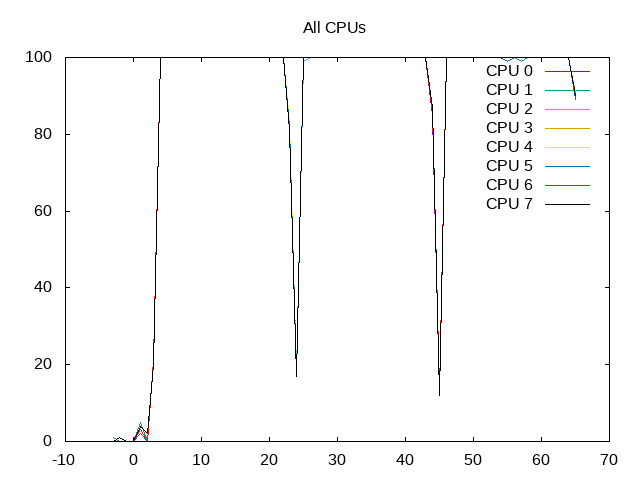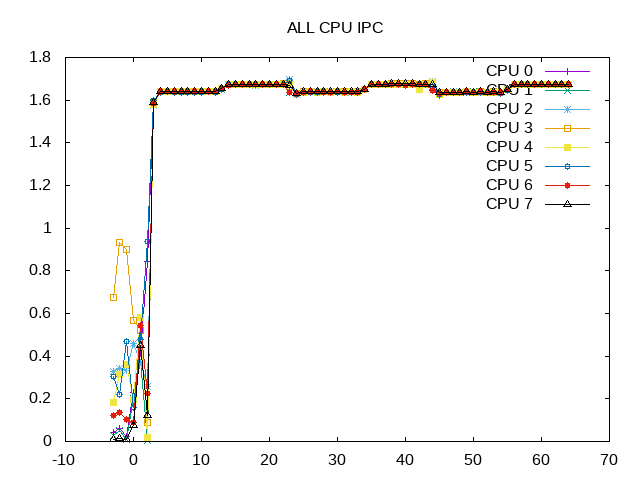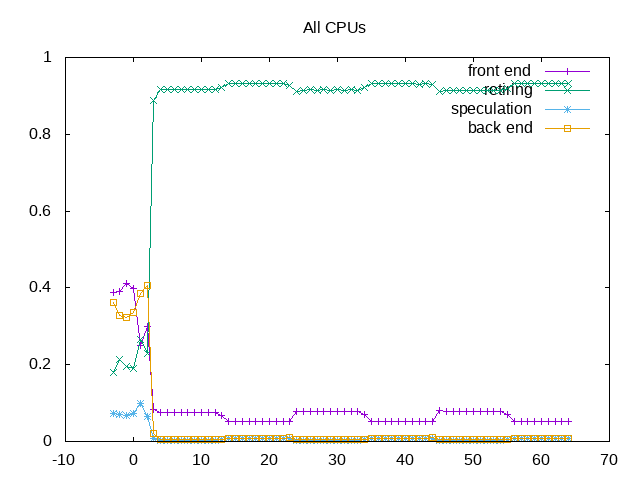Metrics (Intel) - phoronix/opensslOpenSSL is an open-source toolkit that implements SSL (Secure Sockets Layer) and TLS (Transport Layer Security) protocols. This test measures the RSA 4096-bit performance of OpenSSL.
openssl - pid 15104 On_CPU 0.999 On_Core 7.993 IPC 1.656 Retire 0.923 (92.3%) FrontEnd 0.065 (6.5%) Spec 0.006 (0.6%) Backend 0.006 (0.6%) Elapsed 20.03 Procs 10 Minflt 1417 Majflt 0 Utime 160.09 (100.0%) Stime 0.00 (0.0%) Start 445252.55 Finish 445272.58
Metrics show this benchmark is among the highest at being scheduled on the CPU and retiring instructions.
The benchmark runs for approximately 20 seconds and is scheduled almost 100% of the time. More than 90% of the slots are retiring instructions with little time waiting for backend or frontend issues. The IPC is thus also correspondingly high.
sh - pid 6485 On_CPU 0.998 On_Core 15.970 IPC 1.115 FrontCyc 0.001 (0.1%) BackCyc 0.038 (3.8%) Elapsed 20.05 Procs 19 Minflt 2605 Majflt 0 Utime 320.20 (100.0%) Stime 0.00 (0.0%) Start 41101.61 Finish 41121.66
Area to investigate further, why is IPC so much lower on AMD.
Process Tree - phoronix/openssl
Process Tree
The process tree is simple and symmetric. One process running on each core.
15104) openssl elapsed=20.03 start=0.00 finish=20.03
15105) openssl elapsed=20.03 start=0.00 finish=20.03
15106) openssl elapsed=20.03 start=0.00 finish=20.03
15107) openssl elapsed=20.02 start=0.00 finish=20.02
15108) openssl elapsed=20.02 start=0.00 finish=20.02
15109) openssl elapsed=20.02 start=0.00 finish=20.02
15110) openssl elapsed=20.02 start=0.00 finish=20.02
15111) openssl elapsed=20.02 start=0.00 finish=20.02
15112) openssl elapsed=20.02 start=0.00 finish=20.02
15113) openssl elapsed=20.03 start=0.00 finish=20.03
 About this graph
About this graph
All cores are scheduled.

Very high IPC.
 About this graph
About this graph
Top down plot shows >90% of slots retired. There seem to be two phases on each run.
Overall, this benchmark comes across as small and almost entirely retiring instructions. Not as interesting to investigate further bottlenecks but instead more a reference to compare with other workloads or other platforms.
Next steps: Why is the IPC on AMD lower than Intel? This benchmark shows some of the larger differences. Note: Further analysis suggests the MULX instruction plays a role here. See this blog post.
